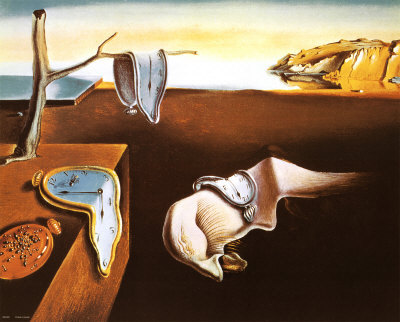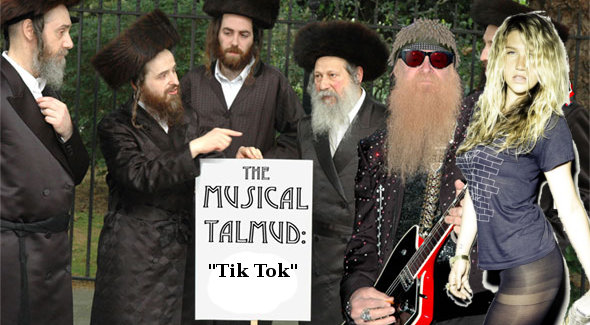I’m not going to say that Ke$ha is the next evolution of pop…
Eh, why not, I’ll say it, whether it’s really true or not – “Ke$ha is the next evolution of pop.” I sorta did anyway already. Let’s court controversy.
Observe:
But remember what evolution actually means. People often erroneously assume evolution is like progress. That is means things are getting better. Evolution doesn’t mean that at all; it isn’t normative. There is nothing inherently better about a rabbit that is white in the winter versus a rabbit that is brown in the winter.
Evolution is the product of things that survive and breed. It’s about adapting to hostile environments. Popular music faces a very hostile environment these days – sales are way down, noise is way up, and getting a single anything to last in the popular conscious for more than an afternoon is a herculean feat.
What sort of song evolves in this environment?
What rough beast, its hour come round at last, slouches towards Bethlehem to be born?
And when it wakes up in the morning, why does it feel like P. Diddy?
Read on. Don’t stop. Don’t ever stop. Keep going. Read read read. Tonight, I’mma fight ’till you see the sunlight!
Talk to a bunch of folks above the age of 16 about Ke$ha, and if they know who she is at all, they tend to volunteer information along a few themes:

- Don’t hate the player, hate the game. Really hate the game.
Ke$ha is a skank. Heavy drinking, sleeping around, looking like a slob, etc.
This is, of course, the point; she’s not doing this by accident. It takes a lot of time and money to look that bad in precisely that way; her mom is one of her songwriters; she’s not Amy Winehouse. Judging her fictional or real persona in these terms could be potentially interesting, but it would probably get tired real fast. Yeah, she threw up in Paris Hilton’s closet and palled around with Flo Rida without being paid for it (and I don’t know if this was sexual at all). Sure.
I don’t particularly like using words like “skank” or “slut” for anyone. Ke$ha’s just doing stuff male rock and rap stars have done forever, but kicking up dust because she’s a woman. That notwithstanding, I’m going to save the third-wave feminist critique of Ke$ha for another time. (I know; I can already hear the collective moans of disappointment from the OTI readership).
In other words, don’t be a hater.
Ke$ha is a hack. She doesn’t sing very well, her songs are kinda crap, she’s too heavily autotuned, etc.
Ke$ha’s beats and mixing are pretty interesting at times. She’s as much of a rapper and “hype girl” as a singer. People look past this sometimes because she’s a young white woman, but it explains her MC/DJ vibe and lack of vocal virtuosity. Comparing her to Taylor Swift, which I’ve heard and read a lot, is kinda silly, except that neither one is an especially great singer. Comparing her to Lady Gaga is also kind of off – Lady Gaga is a performance artist, whereas Ke$ha is a recording artist. Thank Dr. Luke and Max Martin for the rest.
But yeah, Ke$ha’s music is thoroughly commercial. Fair enough.
In other words, don’t be a hater (Again! Again!)
Ke$ha is catchy.
Ah, there it is! There’s the important one! I knew I started this post for a reason!
In many cases, “catchy” seems a difficult thing to parse. Bottling and settling “catchy” is lucrative business, because very few people can actually do it well and consistently. Read the “stickiness” chapter of The Tipping Point if you want to know more about the efforts various businesses and educators have made to try to master “catchy.” Bottling “catchy” means making Sesame Street in a laboratory.
Ke$ha, and more importantly her producer/songwriters/mixers Dr. Luke and Max Martin, create catchy with blunt instruments. There isn’t much about “Tik Tok” that is mysterious. Everything is right out there in your face, even when it’s complex.
“Tik Tok” has few hidden virtues, but one thing it does have that doesn’t appear up front to be as important as it is in practice is how weird it is. This is a weird song with lots of weird moments, and the catchy is in the weird.
Who you callin’ weird?
There are a lot of times in the song where she says something that’s just wrong or odd or off or a little bizarre. For example:
One of the first things she does is put on her glasses. What? Glasses? Why is that in such a hard-core party song? And she’s not wearing them in the video.
Brushing her teeth with a bottle of jack doesn’t seem like something somebody who cares a lot about her appearance would do. It sounds pretty awful.
The boys are “touching her junk.” I don’t think this usually means what she thinks it means.
She says she pushes away the guys unless they look like Mick Jagger. Who is, of course, 66 years old.
Her voice is frequently slurred, either by performance or in postproduction, to the point of barely hanging on to its quality as a voice at times.
One theory — Given that the speaker seems like an aging degenerate alcoholic who gets up in the morning to go to the bar and is briefly thrilled and encouraged by the artifice of a petty showman of false hope, I’d say this song was written for a musical version of Eugene O’Neil’s The Iceman Cometh.

"You build me up. You break me down. You've got the sound, yeah you've got me."
Eh, as fun as that’d be to watch, let’s move on.
Stay up late
Another angle on this is that it says something new. That the departures in form come from a departure in function. But it really doesn’t. This song is just one in a long line of songs about how totally awesome and rebellious and/or affirming it is to stay up late. Circadian rhythm is an emeny who must be opposed by force! “I’mma fight ’till we see the sunlight,” as if there’s anybody or anything that’s going to try to stop you.
As an insomniac myself, I’m pretty fond of this subgenre. This was my favorite song in it for a long time:
But I’m convinced this song is actually one of the high points of human civilization to date. I will definitely write a post about it in the future:
And, of course, “Tik Tok” is really just footnotes on Bill Haley and the Comets:
Mnemonic devices

Do I ever tire of referencing this movie? The answer is no.
Okay, brass tacks – when you’re making a pop song for the goal of mass popularity in this media-saturated market, “quality” is kind of an irrelevant goal to shoot for. Well, it’s relevant, but it isn’t sufficient. You can make the best song ever, but there’s so many blinking lights and electronic noises out there that nobody would care. “Quality” doesn’t drive evolution. It isn’t a characteristic that causes one song to thrive and reproduce while another one fails. So its distribution over time is going to be kind of random, and it isn’t the thing producers most shoot for.
“Catchy” is the goal. A song that sticks with you and markets itself. A song that’s remembered amid the noise. Songs are evolving to more directly manipulate our memories. “Tik Tok” is a great example of this.
Pop songs these days have a clever design element — they contain deliberate “disruptions” — moments of wrongness or of pattern breaking that serve not just an aesthetic purpose, but a cognitive one. The moment in this song where she says “tipsy” and everything slows down for a bit is one. The lyrical points I’ve pointed out earlier that draw your attention because they’re wrong are the others.
The purpose of these is to make you notice it and to make it memorable. And it works. Songs that do this well end up stuck in your head and get widespread popularity. Even if the immediate effect is unpleasant or undesirable, over time the brain adapts to the pattern and you get a little shot of pleasure for expecting the disruption and then finding it.
I was thinking of this particularly in the context of “Jessie’s Girl.” The line “I want to tell her that I love her, but the point is prob’ly moot.” is awful. Like, it stands out as a totally terrible lyric — it doesn’t scan right, it’s totally outside the tone of the rest of the song, and this word “moot” doesn’t really belong in a song like this — Rick Springfield isn’t building a syllogism here. Most people aren’t even 100% sure what the word “moot” means.

Does anybody ever ask about Jesse? What happened to Jessie? Did they get married or something?
I posted a question about it to my facebook page, and some people are putting up comments about how much they love that one line in the song and how the song would be ruined without it. Not many people, but surprising people – not people I think of as fringy or into enjoying things ironically.
The point is that the line is different and weird, it stands out, it draws attention, and, as the song is repeated and repeated and repeated, it becomes memorable and people come to expect it. Even though it’s the worst part of the song from an aesthetic standpoint.
Now, I think you can argue for the merits of this line or for any of the lines in the “Tik Tok” song (things like this are rarely cut and dried), but for the purposes of this discussion, I think it all points to the same phenomena — making parts of your song stick out, break the pattern, and appear ugly so that it gets people’s attention and hooks them into the song. It’s a cognitive stunt, and an effective one.
In closing
I’d also note that, totally unrelated to everything, the name of the song is kind of inappropriate. The song is about pumping up music and having a never-ending party where you are barely conscious of the passage of time. It’s pretty unlikely that over the course of the events of the song that anybody actually perceives the noise of the clock.
Not to mention that it’s unlikely these places have clocks that operate by analog mechanical motion. These people check the time on their cell phones. Even the wall clock with sweeping hands is probably electronic. There is very little “clockwork” in the modern world in the traditional sense, especially in the world of live entertainment. None of these clocks are doing much “tik”ing or “tok”ing.

If a clock toks in a dance club, and nobody hears it over the autotuned pop/rap, does it make a sound?

One point that I’m surprised you skipped over (and I personally love) is that she WAKES UP in the morning and then hits the city, not comin’ back. Consider that statement for a minute. What the hell club is she hitting? I mean, I’d like to get up and go clubbin’ and get smashed at 11 AM, but I’d imagine most nightclubs are closed. The whole chorus is about how she’s gonna party until the sun rises. She is going to be partying for a LONG time, nearly 24 hours. That is DEVOTION.
@Matt this was actually the first time I heard about ke$ha but I and surely other nightliving people often refer to late afternoon as “the morning”
could that be the correct interpretation?
anyway I spent a lot of hours overthinking the meaning of “survival of the fittest” and its implications, of which this is another great exapmle, thanks for that
btw. I wouldn’t say that progress is necessarily a good thing (not even as a figure of speech), at least when I’m from we are very cautious about anything labeled progress
and who ever heard of proper capitalization on interwebs…
this thing needs edit button…
This is perceptive, and a fun read. But I take exception to the idea that “cognitive stunts” meant to engage or otherwise mess with your memory are somehow opposed to, or orthagonal to, “quality.” We tend to think that music is sound art, meaning that sound is the medium for music the way that oil paint is a medium for visual art. But remember that the medium is literally what some other thing is transmitted through. A painting is a luminous form realized through oil. Music is a mnemonic form realized through sound. A particular piece of music can sometimes deemphasize this, aiming for sound for sound’s sake, but this is actually pretty rare… and the cognitive/mnemonic element is always going to be there on some level. So I don’t understand how the disruptions in this song are inherently more gimmicky or calculated than, say, verse-chorus form. Or rhyme, for that matter.
I’ve never heard the song before this post and have only heard about her in pop culture commentary mockingly refered to as “Key Dollar Sign HA!”.
Obviously, the song is a dissection of our current culture and the passage of time. Note how the music blends so well with the “tik tok” repetitive beat. It is impossible to escape the passage of time and even indulging in immature, sensory indulgence doesn’t break the “singer” from the rhythm of the beat. That clock could be ticking down to when she’ll finally have to rejoin the productive members of society or when she will face the reality of death. Regardless, no matter what she does, it will fail to make an impact. The clock keeps ticking regardless of human endeavor or failure/time-wasting.
The fact that you can compare Taylor Swift and Ke$ha because they both have less than stellar singing voices is probably the argument most people are launching in their criticism of current music in general.
I’m confused by the timing of the song. “When I leave for the night I ain’t coming back.” Does she mean the coming night (as it’s currently morning)? Otherwise, hasn’t she already come back, thereby diminishing her credibility from the beginning?
http://en.wikipedia.org/wiki/Unreliable_narrator
I still don’t like the song, simply because I prefer displays of vocal ability and range in ballads to catchy upbeat tunes but due to your (and my own) overthinking, I have grown to appreciate it more.
I thank you, Mr. Fenzel.
@cat:
Does she necessarily say that she leaves for the night EVERY night? I imagine her as a sort of binger partier, only satisfied by intense all night parties, and left wholly cold by less worthy partying, to which she prefers ordinary pursuits.
Note the shock of her parents when she comes downstairs. Were this a regular occurrence for her, their reaction would more closely mirror mild disdain, rather than eye bulging bewilderment.
In addition to the weirdness of the song that you described, it should also probably be noted that she has a dollar sign in her name. In terms of drawing attention and making oneself stick out, that certainly helps. I’m not one for much ironic appreciation or seeking out pop culture banalities and low points for amusement’s sake, but even I couldn’t resist the lure of listening to a song called “Tik Tok” by a woman with a dollar sign in his name. Of course, when I listened to the song it was an unpleasant, unamusing experience, but she got my listen when none of her contemporaries can.
@stokes
Yeah, verse-chorus form and rhyme and stuff are equivalent, and you make a sound point from a musical perspective.
I guess I was attributing an intention to these choices based on inference rather than noting something necessary.
But I was also asking “what is unique about THIS song,” and I think it showed that side of what was going on, even if there are other ways of interpreting it as well that this song doesn’t articulate as specifically.
Maybe I should have gone with the third-wave feminism.
I’ve been thinking about it more, and while I stand by my claim that the moments of intentional “ugliness” and whatnot are artistic choices (in this song and elsewhere), I do think that you’ve described an important trend in recent pop. There’s probably a pretty direct line to be traced between that slowdown on “tipsy” and 2002’s “ti esrever dna ti pilf nwod gniht ym tup I.”
And regardless of why they’re there, those “wrong” moments are far and away the most significant parts of the song. So yeah, that’s definitely worth pointing out.
@Valatan: Are those supposed to be her parents? I assumed she’d just broken into someone’s house and fallen asleep in their bathtub. Notice how when she picks up the toothbrush at the beginning, she does this little flourish with her wrist that says “oh, let’s use… this one.” And she’s not in the family photograph.
I had never heard of Ke$ha before reading this, but something about her video strongly reminded me of Katy Perry. And, although Katy Perry is certainly not a rapper (at least not in the two songs of hers I know), after watching “Tik Tok” and “Waking Up in Vegas” back to back, I think there is a great deal of similarity between the two.
The easy themes for Katy Perry are the same as the ones named for Ke$ha: skank, hack, and catchy. Perry’s songs don’t contain as many jarring moments of “wrongness” (though I would say that anyone who sings “we need a taxi, ’cause I’m broke” doesn’t have much experience we taxis), but both women promote a hard-partying lifestyle regardless of consequences and style their videos with bright colors and eye-catching costumes.
So I guess I’m suggesting Katy Perry as another aspect of the next evolution of pop.
Had you gone with third-wave feminism, I feel this comment would have been more useful.
@fenzel: When she talks about putting on her glasses, I think she means sunglasses.
@cat: Reposted for Truth: “It is impossible to escape the passage of time and even indulging in immature, sensory indulgence doesn’t break the “singer” from the rhythm of the beat. That clock could be ticking down to when she’ll finally have to rejoin the productive members of society or when she will face the reality of death.”
The song purports to be about losing yourself and forgetting the passage of time — but remember how often she refers to “night,” “morning,” “morning light.” We are reminded in each chorus that morning is coming. Even though Ke$ha parties regardless of the time of day, she still apparently needs sleep. And so even if she can’t HEAR a clock ticking, she feels it internally (just as she “feels” the beat). People say “tik tok” when what they mean is, “time is running out.” Also, people say “on the clock” when they mean they’re at work — and Ke$ha parties like it’s her job, so … hm. Maybe that’s a stretch. :)
Ke$ha’s carpe diem attitude is always as much about death as it is about life. Partying hard and drinking that much (and possibly doing drugs?) … well, you’re risking death, and Ke$ha is doing this on a daily – nay, hourly basis.
She gets into a car with a guy she doesn’t even know – VERY dangerous. And the whole video begins with her waking up in a house with people that she doesn’t know or recognize (I agree with stokes — they aren’t her parents). She even seems to be advocating drunk driving in the video.
All of these are life and death situations; something very bad could happen to her, if she continues to live this way. She seems constantly aware that there is a time limit on her ability to live this way — either she’ll collapse from sleep deprivation, or die. Hence, tik tok.
@Caroline: Katy Perry and Ke$ha are friends, actually. Ke$ha is in the video for “I Kissed A Girl”, and I think they’ve sung back-ups for each other before … I seem to recall reading that somewhere, don’t know the specific songs.
Also, they’re often mistaken for each other because they have similar singing voices (husky mezzo belt). Lots of people thought it was Katy Perry’s voice in Flo Rida’s “Right Round” (and you can still find mislabeled lyrics online that claim this) — but it’s Ke$ha.
@Maddy
I had a student today give a class presentation on “3OH!3”, who have apparently recorded with Ke$ha. If she and Katy Perry both reflect the self-destructive aspects of the party girl mentality, do you think that connects to fact that both have recorded with a band whose lyrics are quite blatantly misogynistic? “I’m not taking care of myself, and I’m going to associate with bands that ALSO don’t respect me.”
The counter argument is that all this is a big joke. Ke$ha is creating a satirical character in her videos to make FUN of the danger of this lifestyle. 3OH!3 (what is it with bands that require punctuation marks today?) is satirizing the misogyny of rap with lyrics asking a groupie to “do the Helen Keller and talk with your hips.”
The problem, as was mentioned in a previous post on this website relating to some metal band or other (Steel Panther? I can’t be arsed to go look), is that even if this IS satire, their fans often don’t seem to realize it.
@Dan:
The problem, as was mentioned in a previous post on this website relating to some metal band or other (Steel Panther? I can’t be arsed to go look), is that even if this IS satire, their fans often don’t seem to realize it.
Agh! Internal linking fail! I gotcha, don’t worry:
http://www.overthinkingit.com/2009/12/22/parody/
In my humble opinion, those musical anomalies are what drive the evolution of music. Not just moments of uglieness but, whole systems of being just off putting enough to be memorable. Like the dominant use of seven chords in blues. The crackling of overdriven tube amps. They are like the deafening sound of silence when the hum of your computer fan turns off. You get used to certain sounds, you don’t really taking notice until you hear something different.
@perich
Actually, I was thinking more of THIS Steel Panther post, which discusses the reactions of fans who may or may not get the joke.
http://www.overthinkingit.com/2009/12/01/steel-panther-heavy-metal-parody/
@Dan
I think there’s a third choice for the attitude that informs glamorizing a self-destructive lifestyle the way Ke$ha and Katy Perry do. Rather than producing satire or expressing low-self esteem, they seem to be seeking power by embracing (and thus taking control) of behaviors associated with dominated females. I think the attitude says “I own the lifestyle I choose, and am so valuable that I can use the ways you objectify me to control you” instead of “I let you control and objectify me because I am not valuable” or “This lifestyle is silly.”
@Caroline
That’s really interesting. Let’s assume that IS what Ke$ha and Perry are thinking.
What does that imply for their listeners? How self-aware are they? Are they more likely to engage in self-destructive behaviors as a result of embracing the music, even if the music itself was made as a form of “stealth empowerment?” Does it still encourage misogyny on the part of male listeners who don’t realize the implications?
At least she’s not singing her own name at the start of songs like Jason DeRulo. I’m not sure how I feel about this overt branding, an audio watermark.
Nobody has a ‘tic’ pun?
@Dan
I don’t really feel comfortable making many assumptions about the behavior of people based on their taste in music. After all, a variety of things cause people to enjoy a given style of music, and it’s possible that plenty of people with no interest in irresponsible partying love this song for other values it has.
Otherwise, this is the topic of fairly lively debate in current feminist theory, so I can only offer my own opinion. Personally, I feel that embracing and promoting the idea of women as objects designed for a good time is damaging to the way women are viewed by society. Although young women following the model of Ke$ha or Katy Perry to to feel that they are rebelling against society’s expectations, they are behaving in a way consistent with the expectations for a “fallen woman” (to borrow a Victorian phrase). The fact that they are making themselves objects to achieve their goals, rather than being made objects by someone else, doesn’t lessen the damage of the objectifying.
I don’t listen to much modern pop but i’ve been a rock fan for ages and male fans ‘glamorizing self-destructive behavior’ goes back as far as the blues, if beyond. the author of this piece is right – she’s doing the rock star persona thing, which ties into the Mick Jagger line. and that’s cool! guys have been writing songs like this for decades… nothing wrong with a girl doing it
@Brimstone
I absolutely agree with you that a lot of what she’s doing is what male rock stars have done for ages, and I agree with Fenzel that she shouldn’t be called a skank for engaging in those behaviors (because I’m no fan of the double standard).
I think a lot of what I’m drawing on is more from the music video than the actual song itself. There’s nothing new about or inherently wrong with the “Party Never Stops” music genre. My critique is aimed more at the actions we see her portray as important to her lifestyle, and the way they fit with the roles women in our culture are expected to fit into.
It’s a thorny subject that we will no doubt have to talk about at length later, but I think it’s important to note that “objectification” is in itself a phenomenon.
I think a lot of people underpants gnome it instead —
1. Look at the woman!
2. ???????????
3. Objectification!
Objectification isn’t _always_ happening, at least not to the point where it is morally problematic.
I’m not saying it isn’t happening in this song or video or whatever (again, that’s material for a later post; I’d have to really think about it).
Here’s another metaphor:
You’re the left fielder in a baseball game. Somebody hits the ball to you.
!!!OUT!!!
Wait, wait, wait. Hold up.
Did the ball bounce before you caught it? Did you even catch it? Were you in fair territory?
I think there’s a temptation, probably driven by an understandable and justifiable caution, but perhaps still an excessive one, to see “objectification” EVERYWHERE.
And in several senses, yes, it is everywhere.
But in the phenomenological sense where it is morally problematic, it can’t be everywhere all the time. Because if it is, and it’s bad, and no one has so far succeeded in creating any space or time free of it, well, then it’s pretty dubious for anybody to actually call on anyone else to do anything about it. In that case, if objectification is all-pervasive and always happening independently of specific causes or circumstances, and if there’s no way to avoid objectifying people while going about your life and it’s bad, then really we have to start learning to live with it rather than condemn it — or, you know, be pessimists.
But these things are probably extreme, because objectification can happen in degrees, and it isn’t ALWAYS happening to an unacceptable degree ALL the time — especially not all the time a man looks at an attractive woman (and this is not to say Ke$ha is especially attractive — again, a later post).
Maybe it’s provincial of me, but if our morals call upon us to ceaselessly condemn our neighbors when they don’t have much in the way of ill intentions (not to say anybody here is doing that, just that it’s a temptation when you’re dealing with vaguely defined moral phenomena – especially when you’re never really sure whether they’re happening or not, so they could theoretically always or never be happening and there’d be no way to discern one from the other), then perhaps we are being too judgemental and we need to reconsider why we are making the moral judgements we make and what benefit they afford us.
Also, there is the nagging truth that something being _wrong_ doesn’t make it _irrelevant_ — you can still learn something from wrongness, even orthogonal things, unrelated to the central lesson.
I actually had no idea who Ke$ha was until Saturday night when a bunch of ladies I was out with started quoting her and telling me she’s the “anti-Taylor Swift, you know, sort of like how Avril Lavine was the anti-Britney.” This is somewhat applicable because of the double-standard for women being alluded to already ^up there^. Their reason when I asked was because she’s tall and blonde. Musically, there *is* no comparison, but she’s still compared because she looks the same And does this kind of comparison come around for men? Not that I can think of. Justin Timberlake isn’t compared to Jason Mraz. Jay-Z isn’t compared to John Legend. Two popular male artists don’t get compared and contrasted just because they’re both selling records at the same time if their styles are different, but it happens to women because they’re women. Not cool, imo, but that’s just me. I’ve heard the argument that boils down to, “But at least they’re being talked about!” The fact that this is a “legitimate” argument says a lot about why it happens, really, and the way society has been structured for so long.
I know the waters have sort of been cleared about the icky bits in the song (between Fenzel and Stokes), but I’d like to point out something I was expecting to see and haven’t yet. What makes things like the slow bit gimmicky as compared to something like rhyme is that they are *not* expected. Yes, rhyme is also a device, but it is an expected, more “traditional” (for lack of a better term- sorry) one- a song that doesn’t rhyme is, in itself, somewhat gimicky as compared to the majority of songs that survive the evolutionary process of music (and I know there are plenty of non-rhyming songs out there that are, indeed, money-makers, but in comparison to rhyming ones, they’re few and far between). They are “calculated” yes, but it could also be argued that they are *more* calculated because they fall off the beaten path and could, perhaps, take much more thought to execute in a successful way (quality not being a means of determination, either- I’d go with Fenzel’s broad definition of “catchy” for this) instead of following the standard formula. The standard formula may be followed because it’s, well, standard, and thought goes into following it, but deviating takes effort, too.
If that doesn’t make sense, sorry.
I’ve soapboxed about this sort of thing with regards to other artists, but I find it rather detestable that her mom would write songs about such a lifestyle for her. “It’s all pretend!” or something? Whether it’s actually pretend or not doesn’t matter- she’s still perceived as being trashy and irresponsible or not by people that may not get the joke, and I personally wouldn’t contribute to something creating that perception about *anybody* as if it were a positive thing, let alone a family member. Even if the point is mocking that lifestyle, it’s thought of as true about her, and it’s kind of ridiculous that her parents would be okay with it.
At least she’s legally old enough to get “tipsy,” though.
“her mom is one of her songwriters;”
“She says she pushes away the guys unless they look like Mick Jagger. Who is, of course, 66 years old.”
That line makes astronomically more sense now.
I wouldn’t write off the Lady Gaga comparison so quickly. Admittedly, “Tik Tok” is the only Ke$ha song I’ve heard, but when I heard the intro, I immediately thought of the intro to Lady Gaga’s “Love Game,” which similarly begins with an electronically distorted spoken section.
Aren’t Ke$ha and Gaga two sides of the same coin? In their videos, Gaga is parading around high-class resorts/hotels (Pokerface) or being pimped to millionaires (Bad Romance), while Ke$ha is jumping from house party to house party. Gaga is at the vanguard of fashion, Ke$sha is wearing the samed ripped jeans each morning she wakes up in a stranger’s bathtub. But they’re both celebrating partying, excess, and assertion of their own sexuality.
The big difference, though, is this: Lady Gaga is always in control. In her videos, she is driving the action; in her music, it’s constructed (to my ears, at least) such that Gaga’s voice pushes the music forward. In “Tik Tok,” however, Ke$ha feels like she’s putting herself into the music wherever she fits. Similarly, in the video she is letting other things, people, etc. take her where she’s going to go. And she doesn’t much care where – what’s one bathtub versus another?
So, Lady Gaga might be Jekyll and Ke$ha might be Hyde, but they may share more than you’re letting on here.
I used to like Tik Tok when it was underground, it’s too pop and now I await Escape Me blowing up on your local top 40/dance station. CHEERS.
If the party is God, than Ke$ha is both a prophet and a martyr.
Did anybody notice that she gives her fancy golden bike to the kids in exchange for the boom box? She rejects something that is traditionally both useful and common (bike, calf) but in this exceptional case is gold and decked up (flags and ‘money’ plate, silk and jewelery) in favour of carrying around the burdensome physical representation of the abstract word (huge boom box playing the music that makes people wanna party, huge stone slabs that tell people to worship God) that seems unwanted by anyone but herself.
She is so devoted that she gives up not just everything she has in terms of possessions and social connections in exchange for the party (I have to assume that’s where her pants went; she woke up alone in a strange house), but even her life, for when she leaves for the night she’s not coming back.
The chorus supports the singer’s mortality with her asking the DJ to blow her speakers, which adds a distinct finality to her situation (she doesn’t say ‘the’ speakers, she says ‘hers’). She attests that she will fight until we see the sunlight (only she is fighting, and yet we are the ones who see the dawn?). Who is this woman, that she must face the ticking of the clock, but the party itself won’t stop? Although the party doesn’t start until she walks in, it will continue after her demise, and – perhaps – because of it.
This is a bit rushed, but amusing, no?
Yay, she will lead us through the party, but it shall not be given unto her to see the morning after, where the party-goers will stumble into the Land of Canaan’s only Denny’s franchise to feast on milk and honey and Moons Over My Hammy.
Considering what goes into Moons Over My Hammy, she might be getting the better part of the bargain.
Heh. That totally should have been “yea,” but I kind of like it how it is. “She will lead us through the party… HOORAY!”